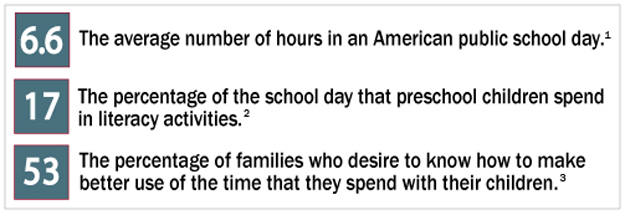The Harvard Family Research Project separated from the Harvard Graduate School of Education to become the Global Family Research Project as of January 1, 2017. It is no longer affiliated with Harvard University.

September FINE Newsletter: Around the Clock: The Power of Anytime Learning
Volume VI, Issue 4, September 17, 2014
 |
|
In this issue, we look at how children’s time is and can be spent learning across the day during the early childhood and elementary years. Addressing the more than 50 percent of families who wish that they knew how to improve the time that they spend with their children, and providing resources for the teachers, staff, and developers who support families, we
We thank you for reading, as always, and invite you to pass this issue on to interested friends and colleagues. We also hope you’ll send us any comments that you might have! |
Commentary
.jpg) |
Finding Time Together: Families, Schools, and Communities Supporting Anywhere, Anytime Learning |
Voices From the Field
| Q & A with Rebecca Parlakian: Learn Anytime With the Let's Play App How can you turn daily bedtime and mealtime routines into learning opportunities for young children? How can commuting, shopping, and other everyday activities offer vibrant learning moments for children? Read about the Let’s Play app to learn how! |
|
 |
The Transition to Afterschool: One City’s Approach to Connecting Young Children and Their Families to Learning and Enrichment Opportunities—Part Two How can you create a resource to help families of young children successfully transition to afterschool? What questions should be addressed? This video looks at one city’s approach to helping connect families and their young children to afterschool enrichment opportunities. |
 |
Sharing Assessment Data With Preschool Families in Preparation for Kindergarten What are the benefits and challenges of sharing assessment data with preschool families? How can you do so effectively? A preschool teacher writes about her experiences, and provides valuable tips on how to share data with families in preparation for kindergarten. |
HFRP Research & Resources
|
Racing to the Top: Maryland's Promising Practices in Family Engagement |
Family Involvement News
 |
Family Involvement News: September 2014 |
HFRP Interact
 |
How Families, Schools, and Communities Are Reshaping Family Engagement to Reach All Learners |
1 National Center for Education Statistics. (2009). Average number of hours in the school day and average number of days in the school year for public schools, by state: 2007–08. Schools and Staffing Survey. Retrieved from http://nces.ed.gov/surveys/sass/tables/sass0708_035_s1s.asp
2 Early, D. M., Iruka, I. U., Ritchie, S., Barbarin, O. A., Winn, D. M. C., Crawford, G. M.,…Pianta, R. C. (2010). How do pre-kindergarteners spend their time? Gender, ethnicity, and income as predictors of experiences in pre-kindergarten classrooms. Early Childhood Research Quarterly, 25(2), 177–193.
3 National Center for Families Learning. (2014). National family learning report. Retrieved from http://www.familieslearning.org/pdf/NCFL_Family%20Time%20Report_Feb%202014.pdf

